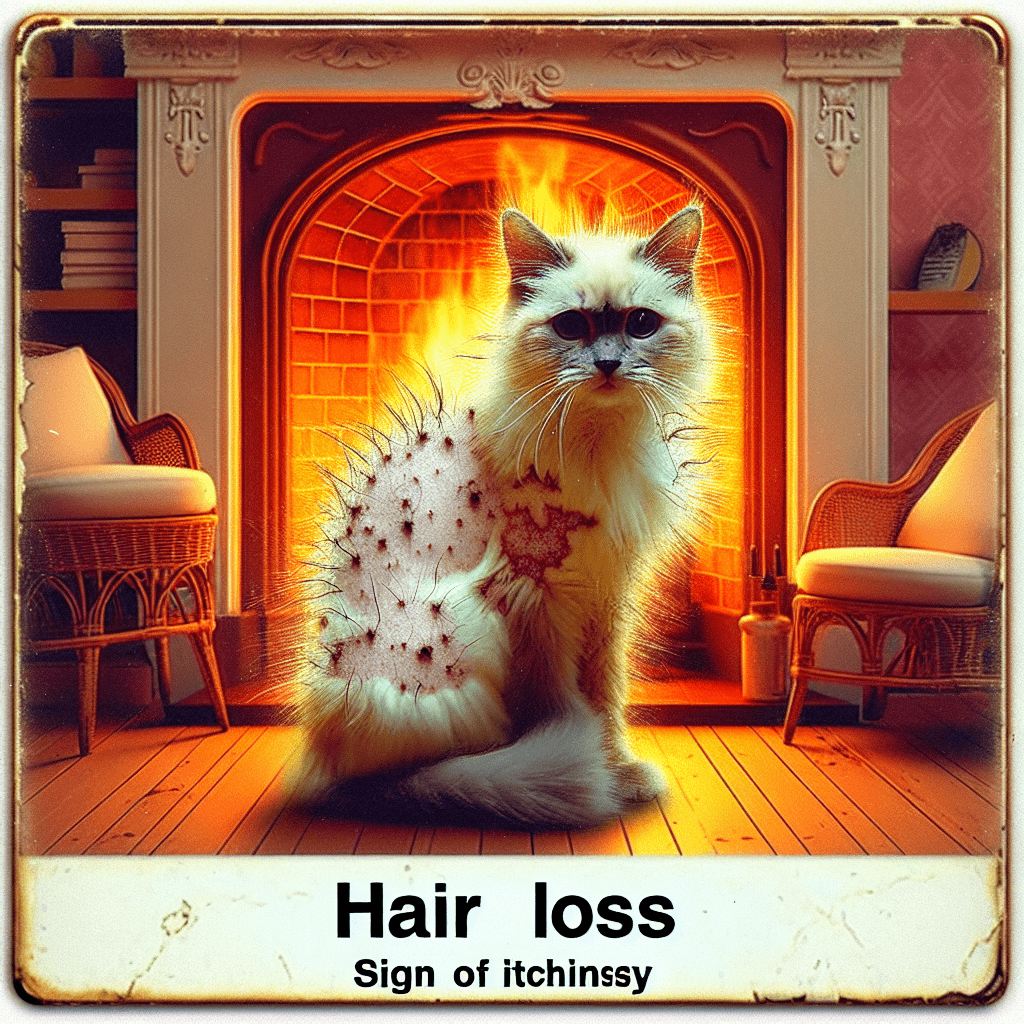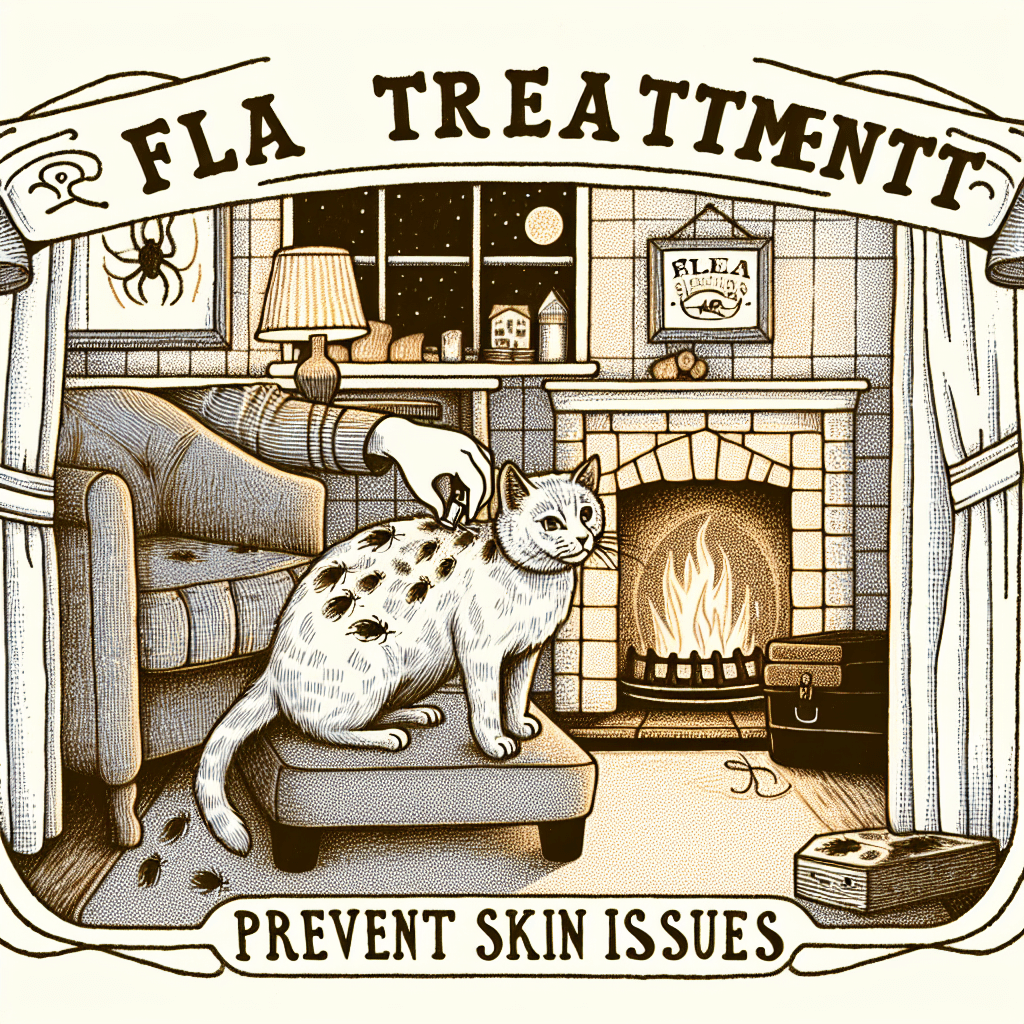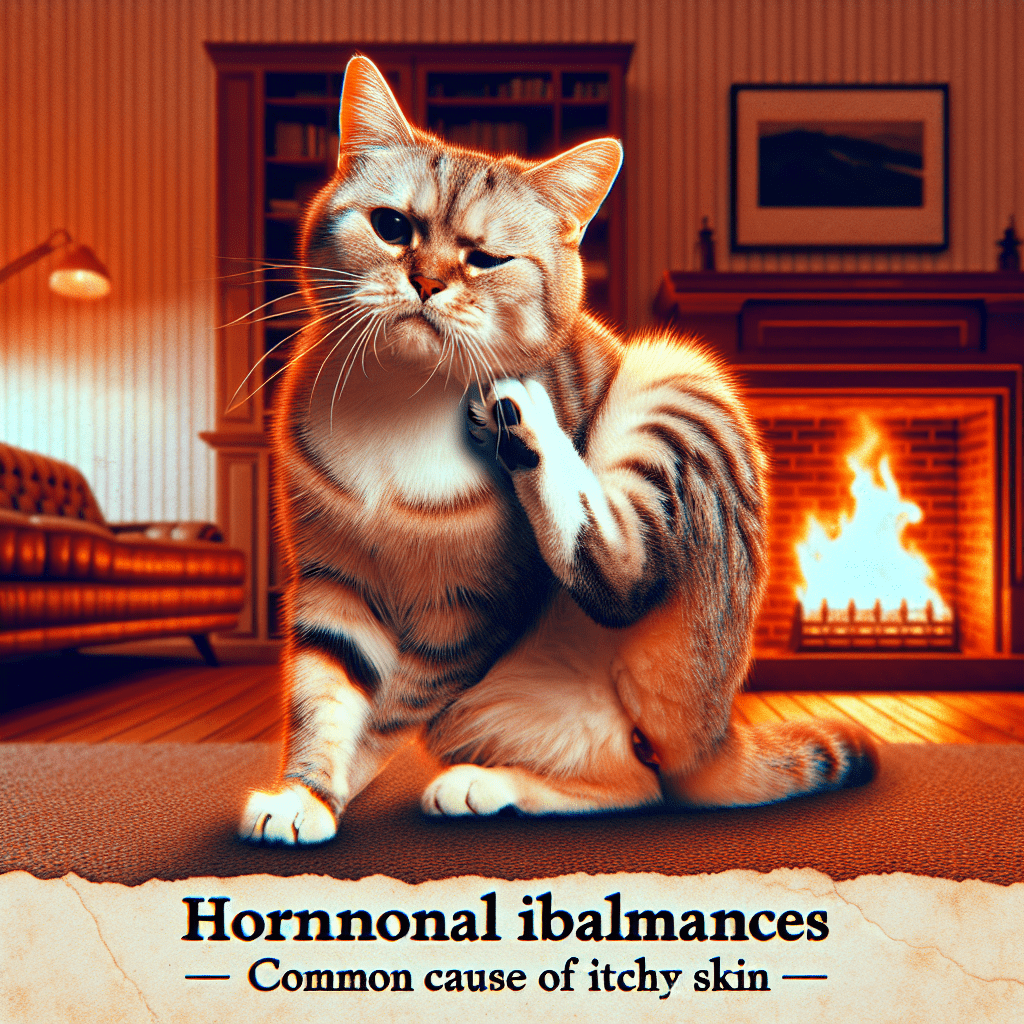Bringing a furry friend into your life is a journey filled with joy and companionship but not without challenges. Itchy skin in cats is a common hurdle that can make our feline companions uncomfortable and grumpy. Are you a devoted pet owner or a cat enthusiast on the hunt for ways to keep your kitty happy, healthy, and itch-free? You’ve landed in the perfect spot! Dive into our blog as we explore the causes behind itchy skin in cats, spot the telltale signs, and unveil natural, effective remedies to give your cat the relief they deserve.
Table of Contents
Common Causes of Itchy Skin in Cats
Understanding what might be causing your cat’s itchy skin is the first step toward finding a solution. Various factors can contribute to this issue.
Allergies
Cats can get allergies to all sorts of things, like certain foods, pollen, dust mites, and even flea bites. When they encounter these allergens, their immune systems go into overdrive, leading to itchy skin and discomfort.
Parasites
Got an itchy cat? Fleas, ticks, and mites are often to blame. These pesky critters can make your cat super itchy and irritable, causing much scratching.
Environmental Factors
Ever noticed your cat scratching more in the winter? That’s because dry air can make their skin dry and itchy. And it’s not just the weather – chemicals or irritants around the house can also bug their skin. Figuring out what’s causing the itch helps you fix it so your kitty can stay comfy and happy.
Signs Your Cat May Show When Experiencing Itchiness
Cats have unique ways of showing they’re uncomfortable. Here are some signs to watch if you suspect your cat has itchy skin.
Excessive Grooming
While grooming is natural for cats, excessive licking or biting at specific areas can indicate itchiness. Pay attention if your cat is focusing on one spot more than usual.
Scratching
Frequent scratching clearly indicates something is bothering your cat’s skin. Look for red or inflamed areas where your cat has been scratching.

Hair Loss
If your cat starts losing hair from too much itching and scratching, it’s time to play detective and figure out what’s up. Catching these signs early means jumping in quickly, stopping things from worsening, and keeping your furry friend comfy.
The Importance of Consulting a Vet for Proper Diagnosis
It’s tempting to try home remedies first, but it’s super important to consult a vet for the right diagnosis. This way, you’ll ensure that any hidden issues get the attention they need.

Accurate Diagnosis
A vet can run tests to determine why your cat’s scratching like crazy. Is it allergies, creepy crawlies, or something else? Knowing this means the treatment can be just what your kitty needs.
Professional Guidance
Vets can give you pro tips and suggest treatments that work wonders for your cat. Plus, they can help you figure out how to dodge future problems.
Monitoring and Follow-Up
Regular check-ups let your vet monitor your cat’s progress and adjust the treatment plan when necessary. It’s all about making sure your cat’s skin stays in the best possible condition. Chatting with your vet isn’t just about getting the right diagnosis; it’s about ensuring your furry buddy gets the best care for its annoying itchy skin.
Diet Tips to Soothe Your Cat’s Itchy Skin
A well-balanced diet is crucial in keeping your cat’s skin healthy and itch-free. Here are some dietary tips that can make a significant difference.

Omega-3 Fatty Acids
Tossing some omega-3 fatty acids into your cat’s diet can seriously reduce inflammation and soothe itchy skin. Fish oil or special cat foods packed with omega-3s can work miracles.
Hypoallergenic Food
If your cat has food allergies, trying hypoallergenic cat food could really help ease those symptoms. This type of food is made to reduce allergic reactions since it’s usually free from common troublemakers like some proteins or grains.
High-Quality Protein
Ensure your cat’s food includes high-quality protein sources. Quality proteins support healthy skin and coat, reducing the risk of skin issues.
Hydration
Keeping your skin healthy means staying hydrated. Ensure your kitty always has fresh water available, and think about giving them wet food since it has more moisture.
Supplements
Think about tossing some skin and coat supplements into your cat’s meal plan. Stuff like vitamins E, B, and biotin can help keep your cat’s skin healthy and reduce itchiness. Just by watching what your cat eats and tweaking it here and there, you can help ease their itchy skin naturally and boost their overall happiness.

Home Remedies and Grooming Techniques to Soothe Your Cat’s Skin
Once you’ve consulted a vet and ruled out serious health issues, you can explore home remedies and grooming techniques to soothe your cat’s itchy skin.
Oatmeal Baths
Did you know oatmeal isn’t just for breakfast? It’s got these awesome anti-inflammatory powers that can calm down irritated skin. Here’s an excellent tip: grind up some plain oatmeal until it’s fine, then mix it into warm water for a bath. Give your cat a gentle soak in this oatmeal mix, letting it sit on their skin for a few minutes before giving them a good rinse. Trust me, it’s a game-changer!
Coconut Oil
Coconut oil is known for its moisturizing and anti-inflammatory properties. To provide relief, apply a small amount to the affected areas of your cat’s skin. However, ensure your cat doesn’t ingest too much, as it can cause digestive issues.
Regular Brushing
Brushing your cat regularly helps remove loose fur and prevents matting, which can irritate the skin. Use a gentle brush suited for your cat’s fur type to avoid causing further irritation.
These home remedies and grooming tips can provide immediate relief and help keep your cat’s skin healthy and comfortable.
Unlocking the Secret to Your Cat’s Radiant Skin Through Diet
Keeping your cat’s skin healthy is all about what they eat. So, how do you make sure their diet is helping their skin stay in tip-top shape? Let’s dive in!

High-Quality Proteins
Make sure your cat’s chowing down on some high-quality proteins. They’re super important for keeping their skin and coat looking good. When picking out cat food, always check that meat is the top ingredient.
Omega-3 Fatty Acids
Did you know that omega-3 fatty acids, like the ones in fish oil and some cat foods, can help soothe your kitty’s itchy skin and make their coat shiny and healthy? Talk with your vet about tossing a fish oil supplement into your cat’s meal plan.
Hydration
Keeping your skin healthy? It’s all about staying hydrated! Make sure your cat always gets fresh water. Tossing wet food into their diet can also help increase their water intake. And hey, keeping an eye on their diet to ensure they’re getting all the proper nutrients can make a difference in their skin health and cut down on that annoying itchiness.

How to Prevent Future Skin Issues in Your Cat
Prevention is always better than cure. Here are some steps to prevent future skin issues in your cat.
Regular Vet Check-Ups
Regular vet visits can help catch skin issues early and keep your kitty feeling awesome. You should just go with whatever your vet recommends for check-ups and vaccinations, right?
Parasite Control
Implement a routine parasite control program to protect your cat from fleas, ticks, and mites. Your vet can recommend effective treatments and preventive measures.
Healthy Environment
Keep your cat’s environment clean and healthy. Use hypoallergenic cleaning products and avoid harsh chemicals. Keep your home’s humidity levels just right to avoid dry skin. These steps will help your cat stay itch-free and comfy, making sure it’s always happy and cozy.
Conclusion
Got a kitty with itchy skin? It’s a tough spot, but getting to the bottom of what’s causing it, spotting the symptoms, and trying effective fixes can turn things around. Always chat with your vet first to get the lowdown on what’s happening and stick to their advice. Try some home remedies, keep up with grooming, and feed your cat a good diet to keep their skin calm and prevent more issues.
I hope this guide helps you keep your furry friend purring happily and feeling great. Do you have any tips or stories of your own? We’d love to hear them! Join our cat-loving community, and let’s support each other in making sure our pets are living their best lives.
Are you thinking about stepping up your cat care game? Join our community today and connect with fellow cat enthusiasts. Together, we can make a real difference for our furry pals!
Frequently Asked Questions (FAQ)
How can I tell if my cat has itchy skin?
If your cat is scratching, biting, or licking their skin a lot, losing hair, or has red or inflamed skin, it’s time to chat with your vet. They can help figure out what’s causing the itchiness.
Is it safe to provide my cat with human fish oil supplements as a source of omega-3 fatty acids?
Did you know that while omega-3 fatty acids are great for cats, human fish oil supplements aren’t the best for them? They can have extra stuff that might not be good for your furry friend. It’s always best to stick to supplements made just for cats. And hey, before you try anything new with your cat’s diet, chatting with your vet is a smart move.
Are there any foods I should avoid feeding my cat to prevent skin issues?
If your cat might be allergic to their food, watch out for common culprits like beef, chicken, fish, grains, and artificial stuff. It’s best to chat with your vet to figure out the best hypoallergenic diet for your furry friend.
How often should I bathe my cat to help with itchy skin?
Cats generally do not require frequent baths, but if your cat has itchy skin, occasional baths with a gentle, pet-safe oatmeal shampoo can provide relief. Consult your vet for recommendations on bathing frequency based on your cat’s specific condition.
What types of brushes are best for my cat’s fur type?
The brush you should use depends on your cat’s fur type. For short-haired cats, a fine-toothed comb or soft-bristle brush works well. Long-haired cats benefit from a wider-toothed comb and slicker brush to remove tangles and matting. Regular brushing helps keep your cat’s coat and skin healthy.
How can I ensure my home environment suits my cat’s skin health?
Keep your place clean and allergy-friendly by using pet-safe cleaners and ditching harsh chemicals. Make sure the humidity in your home is just right to prevent dry skin. Don’t forget to wash your cat’s bedding regularly and vacuum to keep those allergens at bay.
Can stress cause skin issues in cats?
Stress can damage your cat’s skin health by knocking down their immune system, making them more likely to catch infections and allergies. Keeping things chill and stress-free at home and sticking to regular vet check-ups can keep your kitty in top shape.
When should I take my cat to the vet for skin problems?
Notice your furry friend scratching a lot, losing hair, or sporting some red, irritated skin? Or maybe they’re acting a bit off? It’s time to call the vet, pronto. Catching and treating these issues early can save you from bigger headaches.
I hope this little FAQ chat helps you care for your cat better! And remember, for advice tailored just for your kitty, your vet is the person to turn to.
Sarah Smith is a passionate dog and cat enthusiast, blogger, and pet care expert. With years of experience researching and writing about various dog breeds cat breeds, she brings a wealth of knowledge and insight to her blog, PetPession.com. Sarah loves exploring the unique traits, histories, and care needs of different breeds, helping pet owners make informed decisions. Her mission is to create helpful, friendly, and well-researched content that both educates and celebrates the joy of pet ownership. When she’s not writing, Sarah enjoys outdoor adventures with her own furry friends.


1 thought on “10 Tips to Soothe Your Cat’s Itchy Skin Fast”